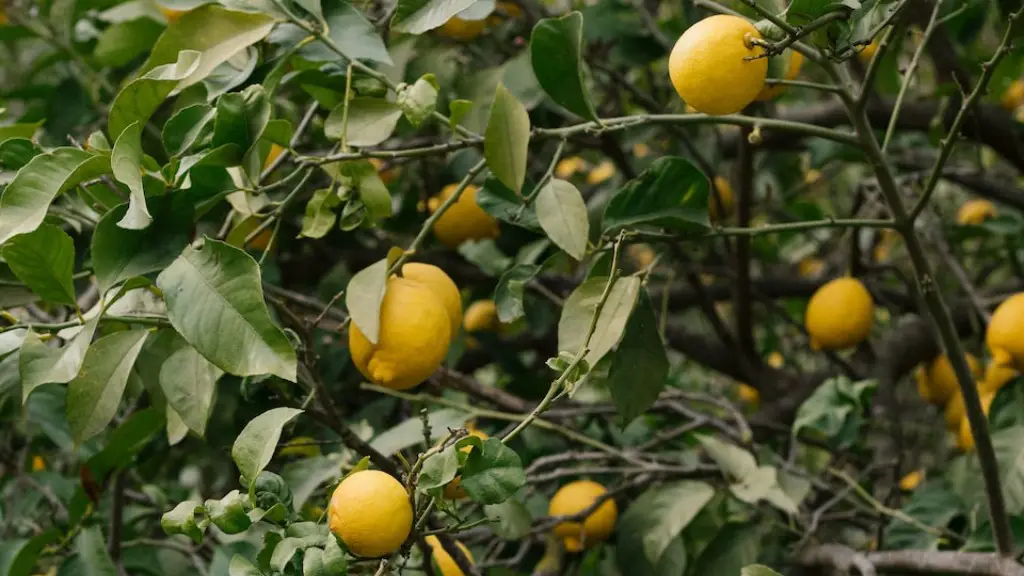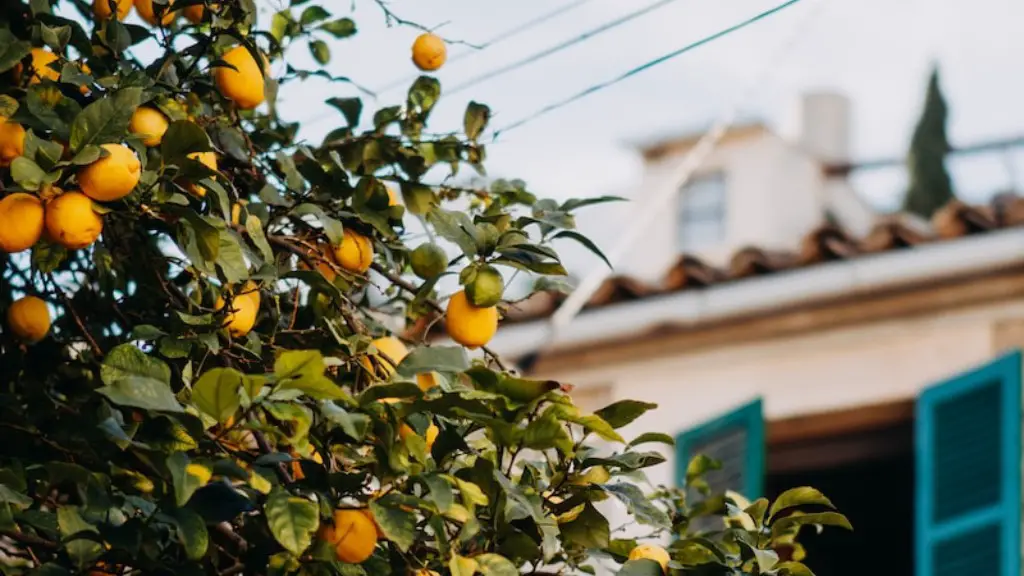Lemon trees can be an attractive and pleasantly fragrant addition to any home garden, but as with any plants, proper care is essential for their health and vitality. Adequate water is no exception. How much water does a lemon tree need? A good rule of thumb is to water your lemon trees deeply and regularly. Established trees need up to 10 gallons of water per tree per week during the summer months, while young trees in their first or second year will require less, somewhere in the range of 5 to 8 gallons weekly.
A good way to determine how much water your lemon trees need is to observe the soil and leaves. Stick your finger or a trowel into the soil up to a depth of 2 or 3 inches. If the soil is dry and the leaves are wilting, it’s time to water. On the other hand, if the soil is soaked or the leaves are drooping, your lemon trees may be getting too much water. Under- or over-watering can both lead to health problems for your trees.
When considering just how much water your lemon trees need, take into account the climate and the amount of rainfall your area receives. For most climates with an average annual rainfall between 16 and 25 inches, an average of 10 gallons per tree per week is generally sufficient. If your area receives more than 25 inches of rain annually, you can cut back on the amount of water given to the trees, but still check for moisture levels in the soil.
Also consider the season and adjust watering accordingly. While summer is the peak growing season, when the temperatures climb and the sun is blazing it is important to give your trees more water, as they will rely on their root systems to support the foliage which is growing and developing. In winter, when temperatures are cooler and the tree has finished its growing season, water little and less often.
Finally, be sure to mulch around your lemon trees, whenever possible. Mulch helps to retain moisture in the summer and can help protect the roots against cold winter weather. It is also a good idea to fertilize your trees with a slow-release nitrogen-phosphorus-potassium fertilizer.
Watering Methodology And Frequency
The best way to water lemon trees is to give them a good drenching at the base of the tree, allowing the water to penetrate deep into the soil. Always water for a longer period of time, allowing the water to reach deeper into the root system of the tree. Keep in mind that shallow watering will only allow for the top soil to become saturated, but the deeper soils may remain dry, which can lead to weaker root systems and overall less healthy trees. Aim to water your lemon trees more deeply but less often, instead of vice versa.
How often should you water your trees? Lemon trees need to be well-watered but not overwatered. Depending on how soon the soil dries out in your area, water your lemon trees up to two times a week. If you live in a dry area and receive little rainfall, water more often. If you live in a wet area, water less. Be sure to check the soil before watering, to ensure that the soil is already dry.
Water Quality
The quality of the water you give to your lemon trees also matters. Generally, tap water is okay for lemon trees, as long as it does not contain too much chlorine or fluoride. If you notice any white streaks on the leaves of the tree, this may be due to an overload of fluoride, in which case it would be better to avoid using tap water altogether. Instead, either collect rainwater, or use distillation systems to separate the fluoride from the tap water.
If your lemon tree is experiencing slow growth, you may also need to test the quality of the water as different minerals can have an effect on the tree. For example, if your water is overly salty, your lemon trees may struggle to take in nutrients, leading to slower growth and weak foliage. In such cases, it is best to use water from other sources, such as rainwater or a reverse osmosis system.
Additional Benefits
In addition to proper watering, lemon trees also require pruning. Pruning helps to keep the tree healthy and increases the yield of fruits. It also helps the tree to grow in an aesthetically pleasing manner, as it encourages even growth of branches. Prune any dead or damaged branches or shoots to maintain the health and vitality of the tree.
It is also important to keep your lemon tree free from pests and diseases. Keep an eye out for pests such as aphids, mealybugs, and whiteflies, which can damage the leaves, flowers, and fruits. You can control pests by spraying the tree with neem oil or introduce beneficial insects such as ladybugs. Be sure to wear appropriate clothing when spraying or pruning your lemon tree to avoid contact with any harmful chemicals.
Fertilizer Requirements and Care
Like other trees, lemon trees require fertilizer. It is best to use a slow-release fertilizer specifically for citrus trees. This can be applied in early spring and again in midsummer, as this is when the tree is most actively growing. Depending on the quality of your soil, you may also need to supplement the fertilizer with additional trace elements.
Taking proper care of your lemon tree will reward you with an abundance of fragrant blossoms and delicious lemons. To ensure that your tree is healthy and vibrant, be sure to provide it with enough water and fertilizer while also pruning appropriately, as well as keeping an eye out for any pests or diseases.
Pruning Hints and Tips
When pruning your lemon tree, it is important to remove any dead or damaged branches and shoots. Also remove any weak branches or branches that are growing in the wrong direction. Pruning of the canopy should only be done when necessary, and even then, only a small portion of the canopy should be removed in order to maintain an overall nice shape of your tree.
Avoid pruning in late autumn or winter, as the chances of fungal infections and pests increase during these times. If you do need to prune your tree in winter, do it as late as possible and be sure to wear protective clothing. When pruning, always make sure to use sharp scissors and trim the branches in even lengths for a symmetrical look.
Summer Care
During the summer months, your lemon trees will need more water than in the winter, so be sure to give them a deep watering up to twice a week. Mulch the soil around the trees to help retain moisture and protect the roots from the hot summer sun. Additionally, be sure to keep a watchful eye out for any signs of pests or diseases, and if spotted, take the necessary steps to control or mitigate the problem.
Fertilizing your trees in late spring and midsummer is also highly recommended. This will give your trees the nutrients they need to grow healthy and strong. You may also want to consider adding trace elements to your fertilizer if needed, such as zinc and iron.
Maintaining Optimal Growth
When it comes to maintaining optimal growth, it is important to be mindful of the water needs of your lemon trees and provide adequate irrigation. Remember to check the soil before watering and adjust your approach according to the climate and season. Mulching and fertilizing will also help to get the most out of your trees, and paying attention to pests and diseases is crucial for the overall health of your lemon trees.



